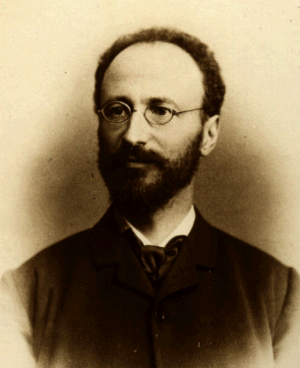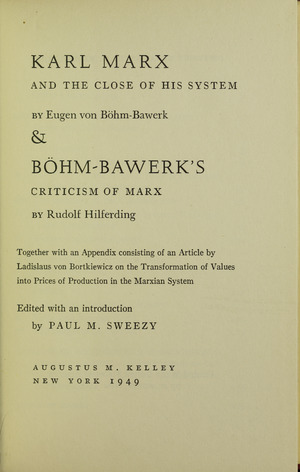Eugen von Böhm-Bawerk facts for kids
Quick facts for kids
Eugen von Böhm-Bawerk
|
|
|---|---|
 |
|
| Born |
Eugen Böhm
12 February 1851 |
| Died | 27 August 1914 (aged 63) |
| Nationality | Austria-Hungary |
| Field | Political economics |
| School or tradition |
Austrian School |
| Alma mater | University of Heidelberg University of Leipzig University of Jena University of Vienna |
| Doctoral advisor |
Karl Knies, Wilhelm Roscher, Bruno Hildebrand |
| Other notable students | Joseph Schumpeter, Ludwig von Mises, Henryk Grossman |
| Influences | Carl Menger |
| Contributions | Criticism of Karl Marx's exploitation theory Time preference |
Eugen Ritter von Böhm-Bawerk (born Eugen Böhm, 12 February 1851 – 27 August 1914) was an important Austrian economist. He helped develop the Austrian School of economics and neoclassical economics. He also worked as Austria's Minister of Finance several times between 1895 and 1904. He was known for criticizing the ideas of Karl Marx.
Contents
Life and Education
Eugen von Böhm-Bawerk first studied to become a lawyer at the University of Vienna. While there, he read a book called Principles of Economics by Carl Menger. This book made him very interested in economics.
Even though he never studied directly under Menger, Böhm-Bawerk became a big supporter of Menger's ideas. A famous economist named Joseph Schumpeter said that Böhm-Bawerk was "completely the enthusiastic disciple of Menger."
During his time at the University of Vienna, he became good friends with Friedrich von Wieser. Wieser later became his brother-in-law. After Vienna, Böhm-Bawerk continued his studies at other universities. He learned about political economy and social science at Heidelberg, Leipzig, and Jena.
Early Career and Teaching
After finishing his studies in 1872, Böhm-Bawerk started working for the Austrian Ministry of Finance. He held different jobs there until 1880. Then, he became a university lecturer (called a Privatdozent) in political economy in Vienna.
The next year, he moved to the University of Innsbruck. He stayed there until 1889 and became a full professor in 1884. During this time, he published the first two parts of his most famous work, Capital and Interest.
Minister of Finance
In 1889, Böhm-Bawerk returned to the Ministry of Finance in Vienna. He became a counselor and advised the government on tax issues. He created a plan to change how direct taxes were collected.
At that time, Austria taxed production very heavily, especially during wars. This made people not want to invest money. Böhm-Bawerk suggested a modern income tax. This new tax was approved and worked well in the following years.
Serving as Minister
Böhm-Bawerk became the Austrian Minister of Finance for a short time in 1895. He held the position again briefly, and then for a longer period from 1900 to 1904. In this role, he strongly supported keeping a fixed gold standard for money. He also worked hard to keep the government's budget balanced, meaning it didn't spend more than it earned.
In 1902, he stopped a government payment (subsidy) for sugar. This subsidy had been part of the Austrian economy for almost 200 years. He finally left his job in 1904. This happened because the army wanted much more money, which would have made the budget unbalanced.
Some people, like historian Alexander Gerschenkron, criticized Böhm-Bawerk for being too careful with money. But Joseph Schumpeter praised him for helping Austria's finances stay stable. Böhm-Bawerk's picture was even on the one-hundred Austrian schilling banknote until the euro currency was introduced in 2002.
In 1897, Böhm-Bawerk became an Ambassador to the German court. In 1899, he joined the upper house of the Austrian parliament. He also became vice-president and then president of the Academy of Sciences.
Important Economic Ideas
Eugen von Böhm-Bawerk wrote many detailed criticisms of Karl Marx's economic ideas in the 1880s and 1890s. Many important Marxists, including Rudolf Hilferding, attended his special classes in 1905–06.
Böhm-Bawerk returned to teaching in 1904 at the University of Vienna. Many future famous economists studied with him there. These included Joseph Schumpeter, Ludwig von Mises, and Henryk Grossman. He passed away in 1914.
Capital and Interest
Böhm-Bawerk's most famous work is Capital and Interest. The first part, published in 1884, was called History and Critique of Interest Theories. In this book, he looked closely at different ideas about why people pay interest on money.
He also included a strong criticism of Karl Marx's exploitation theory. Marx believed that capitalists (business owners) exploited their workers by not paying them the full value of their labor. Böhm-Bawerk disagreed. He argued that capitalists actually help workers by giving them money (wages) much earlier than the business earns money from selling its products. He said, "Labor cannot increase its share at the expense of capital."
Böhm-Bawerk pointed out that Marx's theory didn't consider the time it takes to produce things. He called this the idea of roundaboutness. He believed that if profits were taken from businesses, it would hurt the important role of the interest rate in managing money.
Critique of Karl Marx
In his 1896 book, Karl Marx and the Close of His System, Böhm-Bawerk further examined Marx's ideas about value. He argued that Marx's system had a basic problem. He said that the way Marx explained profit rates and prices in the third volume of his book Capital didn't match his theory of value in the first volume.
Böhm-Bawerk also criticized Marx for not giving enough importance to supply and demand in setting prices. He also felt Marx was unclear about some of his ideas.
Positive Theory of Capital
The second part of Capital and Interest, published in 1889, was called Positive Theory of Capital. In this book, Böhm-Bawerk explained more about how production takes time and how interest payments are involved.
He also developed Carl Menger's ideas about marginal utility. This idea says that things only have value because people want them. This is connected to marginalism, which means the value of something depends on how much extra satisfaction you get from one more unit of it.
To explain this, Böhm-Bawerk used the example of a farmer with five sacks of corn:
Being a thrifty soul he lays his plans for the employment of these sacks over the year. One sack he absolutely requires for the sustenance of his life till the next harvest. A second he requires to supplement this bare living to the extent of keeping himself hale and vigorous. More corn than this, in the shape of bread and farinaceous food generally, he has no desire for. On the other hand, it would be very desirable to have some animal food, and he sets aside, therefore, a third sack to feed poultry. A fourth sack he destines for the making of coarse spirits. Suppose... that he cannot think of anything better to do with the fifth sack than feed a number of parrots, whose antics amuse him. Naturally these various methods of employing the corn are not equal in importance.... And now, putting ourselves in imagination at the standpoint of the farmer, we ask, What in these circumstances will be the importance, as regards his well-being, of one sack of corn?
... How much utility will he lose if a sack of corn gets lost? Suppose we carry out this in detail. Evidently our farmer would not be very wise if he thought of deducting the lost sack from his own consumption, and imperilled his health and life while using the corn as before to make brandy and feed parrots. On consideration we must see that only one course is conceivable: with the four sacks that remain our farmer will provide for the four most urgent groups of wants, and give up only the satisfaction of the last and least important, the marginal utility—in this case, the keeping of parrots.
This example shows that the value of one sack of corn is determined by the least important use the farmer would give up if he lost a sack. This is the "marginal utility."
Some Marxian economists, like Nikolai Bukharin, criticized Böhm-Bawerk's ideas. However, many Austrian economists still see his criticisms of Marx as very important.
See also
 In Spanish: Eugen von Böhm-Bawerk para niños
In Spanish: Eugen von Böhm-Bawerk para niños
- List of Austrian scientists
- List of Austrians
 | May Edward Chinn |
 | Rebecca Cole |
 | Alexa Canady |
 | Dorothy Lavinia Brown |


